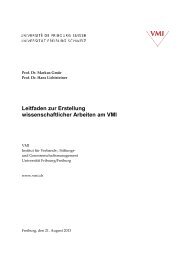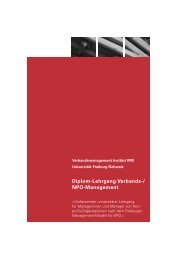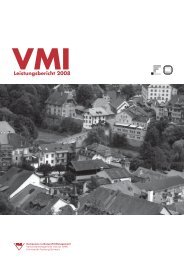Government Policy and the Nonprofit Sector: Switzerland - VMI
Government Policy and the Nonprofit Sector: Switzerland - VMI
Government Policy and the Nonprofit Sector: Switzerland - VMI
- TAGS
- nonprofit
- switzerland
- vmi.ch
You also want an ePaper? Increase the reach of your titles
YUMPU automatically turns print PDFs into web optimized ePapers that Google loves.
Nollert <strong>and</strong> Budowski <strong>Government</strong> <strong>Policy</strong> <strong>and</strong> <strong>the</strong> <strong>Nonprofit</strong> <strong>Sector</strong>: Switzerl<strong>and</strong><br />
The following section will deal with current issues that NPOs <strong>and</strong> umbrella organizations are faced with<br />
presently. Apart from publications we draw <strong>the</strong> information from, we refer to a survey with Swiss experts for<br />
<strong>the</strong> NPO sector in section IV.<br />
IV. CURRENT ISSUES<br />
Looking at <strong>the</strong> publications of NPO umbrella organizations <strong>and</strong> large NPOs, <strong>the</strong> dominant topic is <strong>the</strong><br />
government’s drive to economize. This has resulted in reduced or cancelled subsidies, more stringent conditions<br />
within service agreements, <strong>and</strong> increased competition between NPOs.<br />
An ongoing area of debate of considerable importance is <strong>the</strong> revision of <strong>the</strong> Foundation <strong>and</strong> Fiscal Law for<br />
<strong>Nonprofit</strong> Organizations in <strong>the</strong> Civil Code that has been in effect since 2006. This revision contains among o<strong>the</strong>r<br />
things <strong>the</strong> introduction of compulsory auditing, <strong>and</strong> <strong>the</strong> increase in Federal tax relief in respect of donations<br />
from 10 percent to 20 percent. The revision of <strong>the</strong> Stock Corporation <strong>and</strong> Financial‐Accounting Law (a part of<br />
<strong>the</strong> Swiss Code of Obligations) 51 has also prompted discussion, particularly as right of review 52 regardless of an<br />
association’s legal structure is also planned. In o<strong>the</strong>r words, foundations <strong>and</strong> associations are being put on a par<br />
with incorporated companies in terms of book‐keeping <strong>and</strong> financial accounting law. According to proFonds,<br />
this would make accounting unnecessarily complicated for <strong>the</strong> majority of small <strong>and</strong> medium‐sized foundations<br />
<strong>and</strong> associations.<br />
Many concerns have also been voiced with regard to <strong>the</strong> reform of value‐added tax (VAT), since – among o<strong>the</strong>r<br />
things – <strong>the</strong> Federal Council is proposing that revenue <strong>and</strong> membership fees of organizations concerned with<br />
common welfare should no longer be exempt (see section II.c). ProFonds considers this to greatly weaken<br />
Switzerl<strong>and</strong>’s position as a hub for nonprofit organizations.<br />
The Swiss Council of States is also currently discussing a motion adopted on <strong>the</strong> 25 th of September 2006 that it<br />
would like to move <strong>the</strong> Federal Ombudsman for Foundations from <strong>the</strong> Federal Department of Home Affairs<br />
(FDHA) to ano<strong>the</strong>r department. The motion was put forward because <strong>the</strong> Federal Ombudsman was criticized for<br />
having divided loyalties between <strong>the</strong> government’s political will <strong>and</strong> <strong>the</strong> right to autonomy of foundations <strong>and</strong><br />
<strong>the</strong>ir donors, particularly because <strong>the</strong> FDHA is itself involved in so many foundations.<br />
The contentious Federation Complaint Right remains a controversial topic. Since 1990, more than 15 attempts<br />
have been made in Parliament to abolish this device that was originally introduced by environmental groups in<br />
1966. Fur<strong>the</strong>rmore, development aid organizations such as Alliance Sud have dem<strong>and</strong>ed <strong>the</strong> implementation of<br />
<strong>the</strong> 1970 U.N. resolution requiring 0.7 percent of <strong>the</strong> Gross National Product to be invested in development aid.<br />
One final issue for consideration is <strong>the</strong> recently introduced social time card, which allows NPOs to certify <strong>the</strong><br />
number of hours worked by volunteers.<br />
51 Aktien‐ und Rechnungslegungsrecht im Obligationenrecht<br />
52 Revisionsrecht<br />
19











